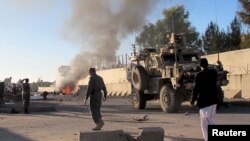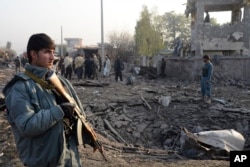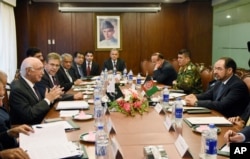Representatives of Asian and other countries have gathered in Pakistan before a regional ministerial conference on Afghainistan.
Pakistan is hosting Wednesday's annual meeting of the so-called “Heart of Asia Process,” which will be jointly inaugurated by Prime Minister Nawaz Sharif and Afghan President Ashraf Ghani.
Members and supporting countries as well as organizations at the meeting will discuss ways to shore up regional counterterrorism and economic cooperation in war-torn Afghanistan.
In preliminary discussions Tuesday, Afghan Deputy Foreign Minister Hekmat Khalil Karzai called for united actions against the “evil” of militancy that he said threatens the world.
“In view of these challenges, we strongly believe that today, like never before, regional and international circumstances require a united and collective approach in the fight against the scourge of terrorism and extremism,” Karzai said.
Karzai reiterated Afghanistan’s resolve to continue its fight against terrorism.
“However, this vision of a peaceful, stable and prosperous Afghanistan, which is in the best interest of the region, is far from becoming reality unless we put an end to financial, logistical and ideological support enjoyed by militants in our region,” Karzai said.
He did not name any country, but Afghan officials regularly accuse Pakistan’s military of secretly supporting the Taliban-led insurgency in Afghanistan, charges Islamabad denies.
Pakistani foreign policy advisor Sartaj Aziz told the delegates closer regional cooperation can play an effective role in eleminating the threat of terrorism.
Aziz reassured the meeting that Pakistan will continue to support all efforts aimed at Afghan peace and security, saying instability in the neighbor country is detrimental to Islamabad’s interest.
“[A] Conducive political and security environment is vital for promoting regional economic cooperaiton and connectivity," said Aziz. "Our region is mired in dire security challenges, which are hampering our socio-economic development.”
The latest meeting of the “Heart of Asia” process is taking place at a time of worsening secuirty conditions in Afghanistan due to an intensifying Taliban insurgency.
Pakistani advisor Aziz says resuming peace talks between the Afghan government and the Taliban will be disussed in a bilateral meeting between Afghan President Ghani and Pakistani Prime Minister Sharif on the sidelines of the ministerial conference.
Indian Foreign Minister Sushma Swaraj has also arrived in Islamabad to attend the regional confernece. This is is the first time in three years, an Indian foreign minister has visited Pakistan, raising hopes for a thaw in relations between the nuclear-armed arch rivals.






